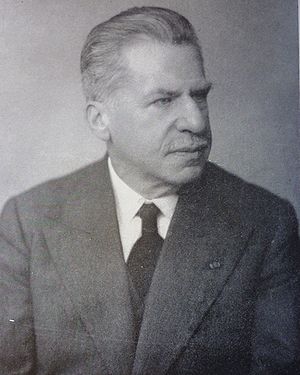Émile Marchal (1871-1954)

When Émile Marchal dies in 1954, he holds the longest membership of the Royal Belgian Botanical Society. He had joined the society in 1891 and was its general secretary for 26 years (1920–1947). His career as a botanist is expressed in a remarkable number of scientific prizes, both in Belgium and other countries, and around 120 publications.
Émile Marchal is born in Maaseik, in 1871. At that time, his father Elie Marchal (1839–1923) is a teacher in this town in Limburg, but he is soon asked to use his talents as a botanist in the brand new State Botanical Garden, founded in 1870. He will be one of the few Belgian scientists to collaborate in the large Flora Brasiliensis project, launched by the Munich botanist Philipp von Martius (1794–1868).
Émile Marchal enters botany via agronomy. He receives the title of agricultural engineer in Gembloux in 1891. There, a former pupil of his father, the renowned professor Emile Laurent (1861–1904), botanist and tropical agriculturalist, notices him and appoints him in his laboratory in 1895. Less than ten years later, Émile Marchal succeeds him to the botany chair. He has thus a preference for the study of plant diseases caused by cryptogamic parasites. For that reason, he becomes director of the State Phytopathological Station in 1912.
His international reputation, however, is in a completely different field, in which he had plunged himself together with his father: bryology. His work on asexual and sexual reproduction in mosses will be of historical importance.
In 1960, six years after the death of the the former honorary rector of the State Agronomical Institute, also a member of the Royal Academy of Belgium, the Royal Botanical Society of Belgium decides to honour the memory and works of this botanist. This is when the Émile Marchal award is founded, with a capital of 20,000 Belgian francs, which is awarded for original work in botany, preferentially in the fields of mycology, microbiology or phytopathology. The prize is attributed every six years.
Text: Denis Diagre-Vanderpelen
Translation: Renate Wesselingh
The following people have received the award in recent years:
| period | laureate(s) |
|---|---|
| 1984–1989 | B. Buyck |
| 1990–1995 | André De Kesel |
| 1996–2001 | Annemieke Verbeken |
| 2002–2007 | Stéphan Declerck |
| 2008–2013 | Nicolas Magain, Caroline Souffreau & Kobeke Van de Putte |
